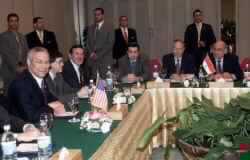- Author:
& News Agencies - Section:
WORLD HEADLINES
Amman, Cairo & Washington Won't Call Powell's Mideast Mission a Failure

HIGHLIGHTS:Mubarak's Cold Shoulder Touch to Powell Reflects Arab Frustration With Washington's Half Hearted Effort.
Arabs Won't Condemn Resistance Bombings.
No Mideast Conference Before Israel Implementing UN Withdrawal Resolution.
(Read photo caption within)
STORYEgypt together with Jordan Tuesday refused to call a 10-day Mideast Mission by US Secretary of State, Colin Powell a failure despite his coming out of the mission empty handed on one hand, and despite Powell getting a cold shoulder from president Hosni Mubarak who cancelled a prescheduled meeting with the top American diplomat, on the other.
Egyptian Foreign Minister Ahmed Maher and Jordanian counterpart Marwan Muasher, who met in Cairo with Powell Tuesday instead of Mubarak, said Israel must withdraw from West Bank towns before Arab nations would join any U.S.-sponsored peace conference - a proposal put forward by Israel and touted by Powell during his Mideast Mission.
POWELL TOLD MUBARAK WAS 'INDISPOSED'
Egyptian officials gave no reason why Mubarak declined to meet the American secretary of state. Powell said he was told Mubarak was "indisposed."
The secretary, however, spoke to Mubarak by phone while he met with Maher and Muasher, the Egyptian foreign minister told reporters. No details were available from the talk.
Analysts said, the cold shoulder from Mubarak reflected the frustration felt by many in the Arab world that the United States has not put more pressure on Israel to end its reoccupation of the West Bank, launched March 29.
EGYPT & JORDAN WON'T CONDEMN RESISTANCE BOMBINGS
In an interview given Monday but published Wednesday, Mubarak said Resistance bombings would only end through negotiations and granting Palestinians their rights.
Maher and Muasher were adamant that Israel must move first. They refused to condemn Resistance bombing.
"I can't imagine that anyone can ask for a condemnation of resistance to occupation. Occupation is there, and as long as there is Israeli violence against the Palestinian people, so resistance will continue," Maher said. "There is no way to stop all these events unless the Palestinian people get their rights back."
Muasher added, "There are no commitments that can be asked of any of the Arab parties before Israel lives up to its commitment which is the immediate withdrawal from Arab territories."
Egypt and Jordan are the only two Arab nations to have signed peace treaties with Israel and are also key U.S. allies in the Middle East.
NO MIDEAST CONFERENCE BEFORE IMPLEMENTING UN RESOLUTIONS
Mubarak said it was also "illogical" to hold a peace conference on the conflict "under such a deteriorated situation in the occupied (Palestinian) territories without an immediate cease-fire and the withdrawal of Israeli forces" from the West Bank.
Maher and Muasher echoed Mubarak's position and said there are no guarantees a conference would be held.
Any conference should be aimed at implementing previous agreements and initiatives, Maher said. His Jordanian counterpart said the conference could only be held with all parties concerned attending - including Palestinian leader Yasser Arafat, Syria and Lebanon.
AMMAN, CAIRO & WASHINGTON DEFEND POWELL MISSION
Maher and Muasher refused to call Powell's visit a failure, saying Powell showed "understanding" of Arab demands and promised to follow up on his diplomatic efforts.
Powell also defended his 10-day visit to the region, saying he emerged with an Israeli promise to pull out of Palestinian towns within a week.
In Washington, President Bush insisted Wednesday that Powell had made progress in his mission.
SOURCE: CAIRO: (News Agencies)
PHOTO CAPTION:
U.S. Secretary of State Colin Powell (far L), his Egyptian counterpart Ahmed Maher (far R) and Jordan's Foreign Minister Marwan al-Muasher (not pictured) meet in Cairo April 17, 2002. Powell left the Middle East after talks with the Foreign ministers of Egypt and Jordan at the end of a Mideast tour that failed to secure an Israeli-Palestinian truce. REUTERS/Aladin Abdel Naby
- Apr 17 12:58 PM


 Home
Home Discover Islam
Discover Islam Quran Recitations
Quran Recitations Lectures
Lectures
 Fatwa
Fatwa Articles
Articles Fiqh
Fiqh E-Books
E-Books Boys & Girls
Boys & Girls  Women
Women









